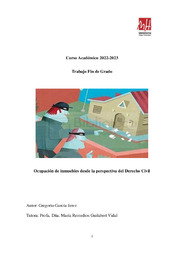Resumen :
El objetivo del pres ente trabajo, es examinar, desde la perspectiva de la vía civil,
haciendo una breve referencia a la parte penal, de la ocupación ilegal de viviendas,
haciendo una síntesis de su naturaleza jurídica y de las acciones previstas en nuestro
ordenamiento, a los efectos de poder prot... Ver más
The objective of the present work is to examine, from the perspective of c
ivil
proceedings, making a brief reference to the criminal part, of the illegal occupation of
homes, making a synthesis of its legal nature and the actions provided for in our legal
system, the effects of being able to protect property.
This phenomenon of
the "squatting" of homes, has its origin as a demand, of
certain social groups, for the purpose of their requests being heard by the public powers,
claiming to have access to decent housing for those sectors that lacked it. and, for the
most part, they liv ed in the middle of the street, a phenomenon known as the “squatter
movement”. Based on this movement, another appeared, also based on the occupation
of homes without legitimate title, but with other purposes, although the most visible part
and the one tha t has done the most damage to the right to property is the one related to
the occupation. of housing with a lucrative purpose, that is to say, not for the fact of
having a house to live in, but for the fact of turning the "occupation" into a business, a
bu siness that, on the one hand, benefits those who are in charge of being up to date. day
of which houses can be "squatted", informing, in exchange for remuneration, who is
going to occupy it, the mafias of the illegal "occupation", and, on the other hand, t he
rise of companies destined to provide a solution to this problem, given the delay of the
authorities in responding to the demands for unemployment.
Due to the increase, especially in recent years, of this phenomenon of illegal
occupation of homes, it is necessary to consider, from a legal perspective, what may be
the legal solutions offered by our legal system.
Throughout the present work, the occupation will be analyzed, proceeding to the
study of the different ways that the owner has to be able to reco ver possession of the
occupied dwelling without a qualifying title. Mainly, the solution of this problem will be
addressed from a civil point of view, although, not for this reason, ceasing to make a
reference to criminal proceedings
|

 La licencia se describe como: Atribución-NonComercial-NoDerivada 4.0 Internacional.
La licencia se describe como: Atribución-NonComercial-NoDerivada 4.0 Internacional.
.png)